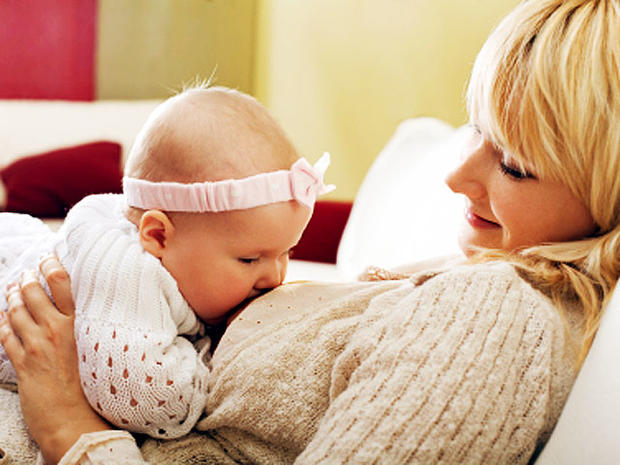Breast-feeding tied to lower risk of sudden infant death syndrome
(CBS) Breast-feeding has been credited with all sorts of benefits, from saving money to helping moms bond with their babies.
But can it prevent sudden infant death syndrome (SIDS)? A new review of previous studies suggests that it might.
PICTURES - 9 places "they" say not to breast-feed
The review, published in the journal Pediatrics, showed that SIDS, a.k.a. crib death, was 60 percent less common in babies who had had any amount of breast-feeding than in those who had been given only the bottle - and a whopping 70 percent less common in babies who were breast-fed regularly.
The review doesn't prove that the reduced SIDS risk was caused by breast-feeding. But study author Dr. Fern Hauck, associate professor of family medicine at the University of Virginia School of Medicine, told Reuters Health she was "fairly confident" that it does. She said, "We found a protective effect even after controlling for factors that could explain the association."
Moms who smoke are known to be less likely to breast-feed their babies and seem to be more likely to have an infant die of SIDS. And SIDS is more common in African-Americans and American Indian families, as well as in male infants and those who have had a sibling or cousin who has died of the disorder, according to the website of the Mayo Clinic.
Hauck said the review also showed that babies who use a pacifier are less likely to die of SIDS, as are those who sleep in their parents' bedroom (but not in the same bed) or on their backs.
The mechanism by which breast-feeding might lower SIDS risk is unclear. One possibility is that breast-fed babies are less likely to get infections that might play a role in SIDS. Another is that breast-fed babies may be more easily roused from sleep than are bottle-fed babies, Medpage Today reported.
But the study's main take-away message seems to be to reinforce the idea that breast is best for babies. Ideally, the researchers said, babies should be exclusively breast-fed for at least four months and should continue to breast-feed at least until age one, according to Medpage Today.
Said Hauck, "Breast-feeding is the best method of feeding infants."
The National Institute of Child Health & Human Development has more on SIDS.
